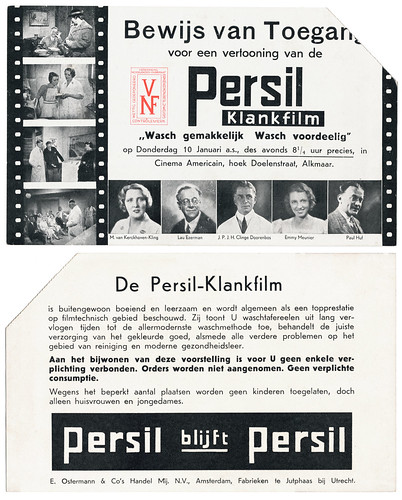Dutch Postcard by m.d. This postcard was probably produced for Ezerman's jubilee as an artist in 1938.
Lost and Found
Laurens Ezerman was born in Rotterdam, Netherlands, in 1892. Originally a bank employee, he played in dilettante societies in his spare time. In 1911, he attended the Toneelschool, Amsterdam. He joined Mertens and Kinsbergen's operetta company (Frascati), but by then had already made his stage debut. As a student of the drama school, he played the role of Viscount de Jodelet in Molière's "Ridiculous Courtly Misses" on 1 February 1912.
Two years later, he was able to get an engagement at the Hollandia Filmfabriek in Haarlem and put an end to his education. His film debut was Nederland en Oranje/Netherlands and Orange (Louis Chrispijn Sr, 1913), a short silent film that portrayed twenty highlights from Dutch history.
He became one of the actors of the ‘troupe’ of the Filmfabriek-Hollandia, the most active producer of silent films in The Netherlands. The company’s main directors were Maurits Binger, Louis Chrispijn Sr and Theo Frenkel Sr.
Chrispijn directed Lau Ezerman in such melodramas as Zijn viool/His Violin (Louis Chrispijn Sr, 1914), Gebroken levens/Broken Lives (Louis Chrispijn Sr, 1914) starring the grand Louis Bouwmeester) and Weergevonden/Lost and Found (Louis Chrispijn Sr, 1914). Most of these films are presumed missing, but Weergevonden was literally found again in 1976.
In 1920 Hollandia united with a British company and Ezerman played in their historical adventure film De zwarte tulp/The Black Tulip (Maurits Binger, Frank Richardson, 1921) and their crime film Bulldog Drummond (Oscar Apfel, 1922), based on a popular novel and play by Sapper (Herman C. McNeile).
Dutch postcard for the stage play 'Don Quichot op de bruiloft van Kamatcho'(Don Quichot on the Wedding of Kamatcho) (1711) by Pieter Langendijk, starring Lau Ezerman as Don Quichotte and Johan Kaart Jr as Sancho Panza. The play was performed by the Schouwburgtoneel of Jan Musch in the open-air theatre in Valkenburg in 1920. In 1925 the play was performed again with Kaart as Sancho Panza at the Amsterdam open-air theatre Frankendaal, this time by the company Vereenigd Tooneel.

Free admission ticket for a screening at the Cinema Américain in the city of Alkmaar on Thursday 10 January 1935. Photos: stills from the advertising film Wasch gemakkelijk, wach voordelig/Do your laundry easily and affordably (Johannes Guter, 1933). Collection: Roloff de Jeu@Flickr.
The Persil 'Klankfilm' (film with sound) 'WASCH GEMAKKELIJK, WASCH VOORDELIG' was a film produced by Persil director E. Ostermann & Co. and distributed throughout the Netherlands by Henkel's laundry detergent brand from 1934 to 1936. Housewives and young women exclusively were invited to see the film for free at private screenings in their local cinema. Other brands in use in the film were Henco, Ato, iMi and Sil. Apparently, this was the first Dutch feature (137 minutes!) with sound with Dutch actors. Some sources label it as a musical. It was directed by the Latvian director Johannes Guter who fled to Germany twice in the early 1900s to become a pioneer in German silent and expressionist cinema. The film was shot at the UFA studios in Berlin, Germany and recorded in several languages (using the same Dutch actors). WASCH GEMAKKELIJK, WASCH VOORDELIG premiered in Amsterdam's Tuschinski Theatre on November 29th in 1933. Newspaper reviews were quite positive.
Philiwood
In 1934 film companies competed to produce the first Dutch talkie. Lau Ezerman played in the 'winner', Willem van Oranje/William of Orange (Jan Teunissen, 1934). This historical drama was shot at the Philips Studios ('Philiwood') in Eindhoven, using the Philips-Miller Filmband, a new system for recording sound.
In the 1930s, directors like Detlev Sierck (Douglas Sirk) and Ludwig Berger and scriptwriters like Walter Schlee went into exile from Nazi Germany and gave the Dutch film industry a healthy impulse.
Ezerman played character parts in such films as the comedy Bleeke Bet/Pale Beth (Richard Oswald, Alex Benno, 1934) and Het meisje met den blauwen hoed/The Girl With the Blue Hat (Rudolf Meinert, 1934) with Truus van Aalten.
In the second half of the 1930s, Ezerman led a wandering existence both in his work and private life. He played in the films Komedie om geld/The Trouble with Money (Max Ophüls, 1936), the popular romcom Vadertje Langbeen/Daddy Long Legs (Frederic (Friedrich) Zelnik, 1938) starring Lily Bouwmeester, Morgen gaat het beter/Tomorrow It Will Be Better (Frederic Zelnik, 1939), and the thriller De spooktrein/The Ghost Train (Carl (Karel) Lamac, 1939), based on the play 'The Ghost Train' (1925) by Arnold Ridley.
In 1938-1939, he worked on stage with his own group, Het Hoofdstadtooneel and with the ABC Cabaret, where he celebrated his 25th anniversary in 1938. In 1941 the Nazis censured films such as Bleeke Bet for reissues and all the Jewish actors including Lau Ezerman were cut from the film, but he would never know that. In 1940 Lau Ezerman committed suicide in Amersfoort at the age of 47.
Dutch Postcard by Monopole Film, Rotterdam. Photo: Dick van Maarseveen, Den Haag (The Hague). Lau Ezerman and other cast members in Bleeke Bet/Pale Beth (Richard Oswald, Alex Benno, 1934).
Dutch postcard by M. B.& Z. (M. Bonnist & Zonen, Amsterdam). Photo: Filma. Roland Varno, Truus van Aalten, Dries Krijn and Lou Bandy in Het meisje met den blauwen hoed/The Girl With the Blue Hat (Rudolf Meinert, 1934).
Sources: TheaterEncyclopedie (Dutch), Geoffrey Donaldson (Of Joy and Sorrow) and IMDb.
This post was last updated on 26 February 2024.
No comments:
Post a Comment